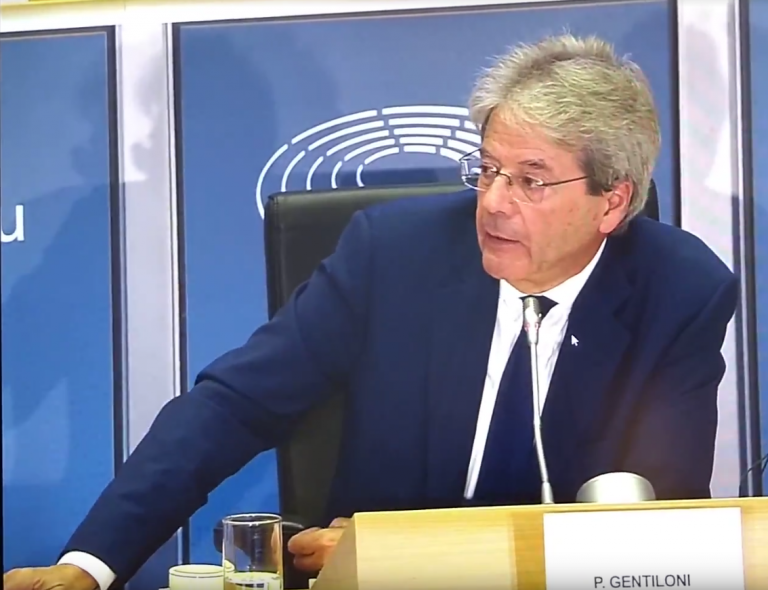Letter of 4. Nov 2020 to Commissioner Gentiloni – Proposal for an annual EU taxation scoreboard
Dear Commissioner,
Dear Paolo,
Thank you for taking up my proposal to establish an EU taxation scoreboard during the first hearing of our new FISC committee. For the follow-up discussion with your staff that you promised I would like to provide you with more details to start giving flesh to the bone.
The EU commission already publishes its yearly “taxation trends” report which provides interesting and up to date information on tax data at EU level and in each Member State. The Tax Trends reports also inform about national tax laws’ modifications. However, these reports do not document whether member states contribute to aggressive tax planning, tax avoidance, tax evasion and tax fraud, including by providing zero or low tax arrangements, by regimes based on weak economic substance or by limited tax cooperation and exchange of tax information.
The Code of Conduct group on business taxation is geared towards curbing harmful tax competition and examines existing or upcoming tax measures from Member States (rollback and standstill processes). It also evaluates third countries jurisdictions in the framework of the EU list of non-cooperative jurisdictions but with a different set of criteria, which are not (all) applied to Member States. While third countries can be declared uncooperative, Member States cannot as the Code of Conduct group on business taxation is a soft law instrument not subject to Commission’s infringement powers.
This causes possible contradictions. For example, the Global Forum on Transparency and Exchange of Information for Tax Purposes recently published a peer review report on Malta, assessing its compliance with the international standard on transparency and exchange of information upon request. This report concluded that Malta was only “partially compliant”. If a third country were subject to this assessment, it would end up on the EU list of non-cooperative jurisdictions but not Malta, as it is a Member State. This unequal treatment shows the need for a more systematic evaluation of EU Member States.
Therefore, I would like to suggest an annual EU tax scoreboard with the objective to assess Member States’ tax practices according to a common set of objective criteria.
Such criteria should at least include:
- the existing criteria used by the code of conduct group on business taxation [1]
- the criteria used to list third country jurisdictions as part of the EU list of non-cooperative jurisdictions [2]
- the past and ongoing infringement procedures launched against Member States for lack of conformity or lack of implementation of European legislation on tax and money laundering matters
- some criteria from the Commission’s 2016 scoreboard [3] prepared for third countries (in the context of the upcoming EU list of non-cooperative jurisdictions), including for examples criteria on financial activity (levels of financial services exports, total FDIs, statistics on foreign affiliates and specific financial income flows) or on stability factors (governance indicators, corruption levels)
- economic indicators used by the Commission in its study on aggressive tax planning [4] in 2017 including tax treaties, interests and royalties payments etc.
An annual procedure will help to improve the understanding of all existing practices and the changes adopted by Member States (thanks to regular updates of the information provided). Providing a scoreboard for all Member States would avoid singling out some Member States as tax havens and provide recommendations for progress to all of them. The results of this scoreboard could be used for the country-specific recommendations under the European Semester and will create public attention on the state of tax cooperation in our ever closer Union.
Although such scoreboard could restore some fairness and increase the level playing field between third countries and Member States, still a comprehensive reform of the 1997 Code of Conduct both in terms of rules and in terms of procedures, and as suggested by the European Commission in its July 2020 action plan, is urgently needed. I fully support this initiative and I am committed to contribute actively to it.
I look forward to discuss this idea further with you and your team.
Best regards,
Sven Giegold
Greens/EFA coordinator in the FISC committee
LINKS
[2] https://data.consilium.europa.eu/doc/document/ST-14166-2016-INIT/en/pdf
[3] https://ec.europa.eu/taxation_customs/sites/taxation/files/2016-09-15_scoreboard-indicators.pdf
[4] https://ec.europa.eu/taxation_customs/sites/taxation/files/taxation_papers_71_atp_.pdf
This letter was a follow-up to the exchange I had with Commissioner Paolo Gentiloni during the first session of the new FISC committee on taxes on 24 September 2020. You can have a look at the full exchange here: https://twitter.com/sven_giegold/status/1309152709279440899?s=20
We received the following reply from the Commission on 10 December 2020: https://sven-giegold.de/wp-content/uploads/2021/01/10.12.2020-COM-Gentiloni-reply-letter-on-annual-EU-taxation-scoreboard.pdf

